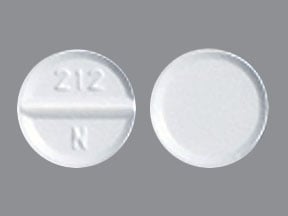
Trihexyphenidyl Coupons & Savings Card – Discount Prices from $10.15
Trihexyphenidyl is a medication primarily used to manage symptoms associated with Parkinson's disease, as well as involuntary movements resulting from certain psychiatric medications. Classified as an anticholinergic, it functions by blocking acetylcholine, a natural substance that influences movement. This action helps reduce muscle rigidity, excessive sweating, and saliva production, thereby enhancing mobility in Parkinson's patients. Additionally, it alleviates muscle spasms and other movement-related side effects caused by certain psychiatric drugs. However, it should be noted that trihexyphenidyl is not effective for treating movement disorders related to tardive dyskinesia and may potentially exacerbate these symptoms. Available in oral tablet and liquid forms, this medication is generally administered multiple times daily. Common side effects may include dry mouth, blurry vision, dizziness, and nausea. While the brand Artane has been discontinued, trihexyphenidyl is available in generic versions. Always consult healthcare professionals for advice tailored to your specific health needs before starting this medication.
Our coupons are free to use. Before paying, show the pharmacist your Trihexyphenidyl savings card to get your free discount. Use our filters below to edit the prescription box to match your needs. The Trihexyphenidyl prices will update based on your prescription needs. Above our Trihexyphenidyl coupons, you can change your location to see pharmacy prices and costs in other areas. We're here to help you buy Trihexyphenidyl at the lowest price with our prescription discount card.
My prescription
Edit
2MG, Trihexyphenidyl (90 Tablets)
Select pharmacy

CVS
$25.76
COUPON PRICE
Walgreens
$10.15
COUPON PRICE
Albertsons
$14.46
COUPON PRICE
Walmart
$28.00
COUPON PRICETrihexyphenidyl savings card
Show this card to your pharmacist
Walgreens
$10.15
BIN
ID
PCN
GRP
015995
LHKPX309728
GDC
DR33
Powered by
Trihexyphenidyl is a medication primarily used to manage symptoms associated with Parkinson's disease, as well as involuntary movements resulting from certain psychiatric medications. Classified as an anticholinergic, it functions by blocking acetylcholine, a natural substance that influences movement. This action helps reduce muscle rigidity, excessive sweating, and saliva production, thereby enhancing mobility in Parkinson's patients. Additionally, it alleviates muscle spasms and other movement-related side effects caused by certain psychiatric drugs. However, it should be noted that trihexyphenidyl is not effective for treating movement disorders related to tardive dyskinesia and may potentially exacerbate these symptoms. Available in oral tablet and liquid forms, this medication is generally administered multiple times daily. Common side effects may include dry mouth, blurry vision, dizziness, and nausea. While the brand Artane has been discontinued, trihexyphenidyl is available in generic versions. Always consult healthcare professionals for advice tailored to your specific health needs before starting this medication.
Our coupons are free to use. Before paying, show the pharmacist your Trihexyphenidyl savings card to get your free discount. Use our filters below to edit the prescription box to match your needs. The Trihexyphenidyl prices will update based on your prescription needs. Above our Trihexyphenidyl coupons, you can change your location to see pharmacy prices and costs in other areas. We're here to help you buy Trihexyphenidyl at the lowest price with our prescription discount card.
Related anticholinergics prescriptions
More prescriptions for Parkinson's disease
coupons from$145.86Save 48%
coupons from$15.41Save 87%
coupons from$89.08Save 93%
coupons from$99.31Save 80%
coupons from$9.93Save 72%
coupons from$5129.88Save 25%
coupons from$330.34Save 87%
coupons from$26.94Save 86%
Related anticholinergics prescriptions
Cuvposa Save 87%coupons from $69.34
Qbrexza Save 70%coupons from $697.24
Anaspaz Save 75%coupons from $7.29
Glycopyrrolate Save 79%coupons from $8.69
Cyclogyl Save 82%coupons from $21.34
Bentyl Save 83%coupons from $15.92
Levsin Save 75%coupons from $7.32
Levbid Save 34%coupons from $32.68
More prescriptions for Parkinson's disease
Carbidopa Anhydrous Save 48%coupons from $145.86
Sinemet Save 87%coupons from $15.41
Comtan Save 93%coupons from $89.08
Pramipexole ER Save 80%coupons from $99.31
Diphen Save 72%coupons from $9.93
Nuplazid Save 25%coupons from $5129.88
Cycloset Save 87%coupons from $330.34
Hyosyne Save 86%coupons from $26.94
Trihexyphenidyl dosage forms
Use our Trihexyphenidyl 2MG coupon with prices from $22.56 for 90 Tablets. You can also use our Trihexyphenidyl 2MG coupon with prices from $11.05 for 32 Tablets. We have a Trihexyphenidyl 2MG coupon with prices from $23.40 for 100 Tablets. You can use our Trihexyphenidyl 2MG coupon with prices from $55.30 for 1000 Tablets.
Dosage Quantity Price from Per unit 2MG 90 Tablets $22.56 $0.25 2MG 32 Tablets $11.05 $0.34 2MG 100 Tablets $23.40 $0.23 2MG 1000 Tablets $55.30 $0.06 5MG 32 Tablets $6.92 $0.22 5MG 90 Tablets $14.92 $0.17 5MG 100 Tablets $16.30 $0.16 5MG 1000 Tablets $67.50 $0.07
| Dosage | Quantity | Price from | Per unit |
|---|---|---|---|
| 2MG | 90 Tablets | $22.56 | $0.25 |
| 2MG | 32 Tablets | $11.05 | $0.34 |
| 2MG | 100 Tablets | $23.40 | $0.23 |
| 2MG | 1000 Tablets | $55.30 | $0.06 |
| 5MG | 32 Tablets | $6.92 | $0.22 |
| 5MG | 90 Tablets | $14.92 | $0.17 |
| 5MG | 100 Tablets | $16.30 | $0.16 |
| 5MG | 1000 Tablets | $67.50 | $0.07 |
